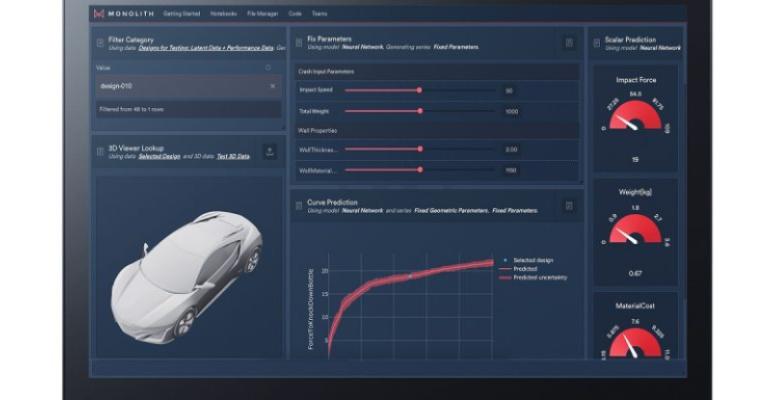BMW is using artificial intelligence (AI) for future models almost as soon as a designer’s pencil touches the drawing board.
The automaker is using software from specialist, Monolith, to apply AI to solve previously impossible physics challenges and predict the performance of highly complex systems like crash and aerodynamics tests. BMW’s crash test engineering team began working with the software in 2019 to explore the potential of using AI to predict the force on a passenger’s tibia during a crash.
Current crash development uses thousands of simulations as well as physical tests to capture performance. Physical crash tests can only be conducted in later stages of development when the design is mature enough to create physical prototypes. So the two companies explored the possibility of using AI to predict crash performance substantially earlier in the vehicle development process. The BMW Start-up Garage, BMW Group’s venture client unit, facilitated this collaboration and helped Monolith grow its business relations with the carmaker.
BMW engineers built self-learning models using the wealth of their existing crash data and were able to accurately predict the force on the tibia for a range of different crash types without doing physical crashes. Moreover, the accuracy of the self-learning models will continue to improve as more data becomes available and the platform is further embedded into the engineering workflow. This now means engineers can understand crash performance earlier in the design process and reduce dependence on time-intensive, costly testing while making historical data more valuable.
BMW is expanding its use of Monolith into more engineering functions across R&D that generate vast amounts of data from crash testing to aerodynamics, motorsports and advanced driver-assist systems (ADAS). Dr Richard Ahlfeld, CEO and founder, Monolith, said: “When the intractable physics of a complex vehicle system means it can’t be truly solved via simulation, AI and self-learning models can fill the gap to instantly understand and predict vehicle performance. This offers engineers a tremendous new tool to do less testing and more learning from their data by reducing the number of required simulations and physical tests while critically making existing data more valuable.
“What’s perhaps even more exciting than the promise of accelerating the vehicle development process is the opportunity for engineers to explore more design parameters and find new relationships between operating conditions without the need for data science support. Suddenly the combination of engineering expertise and machine learning becomes a competitive game-changer and gives our customers the means to create world-class products more efficiently.”
— Paul Myles is a seasoned automotive journalist based in Europe. Follow him on Twitter @Paulmyles_





